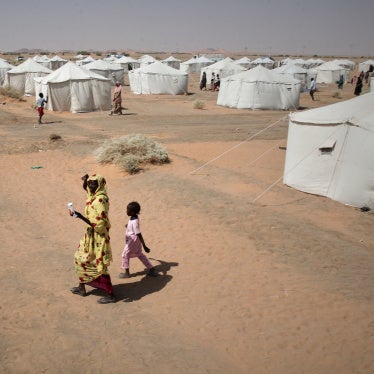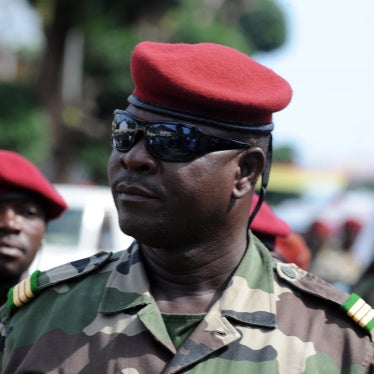A Belgian judge has issued an international arrest warrant charging Chad’s exiled former president, Hissène Habré, with human rights crimes committed during his 1982-90 rule. Habré lives in exile in Senegal, where he was indicted four years ago before courts ruled that he could not be tried there. The Belgian warrant marks a turning point in the long effort to bring Habré to justice, and should lead to his extradition from Senegal to Belgium to stand trial.
Background
Hissène Habré ruled the former French colony of Chad from 1982 until he was deposed in 1990 by current president Idriss Déby and fled to Senegal. His one party regime was marked by widespread atrocities. Habré periodically targeted various ethnic groups such as the Sara (1984), Hadjerai (1987) and the Zaghawa (1989), killing and arresting group members en masse when he believed that their leaders posed a threat to his regime. The exact number of Habré’s victims is not known. A 1992 Truth Commission accused Habré’s regime of some 40,000 political murders and systematic torture. Most predations were carried out by his dreaded political police, the Documentation and Security Directorate (DDS), whose directors all came from Habré’s small Gorane ethnic group and which reported directly to Habré.
The United States and France supported Habré, seeing him as a bulwark against Libya's Moemmar Qaddafi. Under President Ronald Reagan, the United States gave covert CIA paramilitary support to help Habré take power and remained Habré’s strongest ally throughout his rule, providing his regime with massive amounts of military aid. The United States also used a clandestine base in Chad to train captured Libyan soldiers whom it was organizing into an anti-Khaddafi force.
Since Habré's fall, Chadians have sought to bring him to justice. The Chadian Association of Victims of Political Repression and Crime (AVCRP) compiled information on each of 792 victims of Habré’s brutality, hoping to use the cases in a prosecution of Habré. The Truth Commission called for the “immediate prosecution” of those responsible for atrocities. With many ranking officials of the Déby government involved in Habré’s crimes, however, the new government did not indict Habré or pursue his extradition from Senegal.
Habré is Indicted in Senegal
In 1999, with the Pinochet precedent in mind, the Chadian Association for the Promotion and Defense of Human Rights (ATPDH) requested Human Rights Watch’s (HRW) assistance in helping Habré’s victims bring him to justice in his Senegalese exile. Researchers from HRW, the Dakar-based African Assembly for the Defense of Human Rights (RADDHO) and the Human Rights Program of Harvard Law School secretly visited Chad twice, where they met victims and witnesses and benefited from the documentation prepared in 1991 by the Association of Victims. Meanwhile, HRW quietly organized a coalition of Chadian, Senegalese and international NGOs to support the victims. They include the International Federation of Human Rights Leagues (FIDH), RADDHO, the ATPDH, the Chadian League for Human Rights (LTDH), the National Organization for Human Rights (Senegal), the London-based Interights, and the French organization Agir Ensemble pour les Droits de l'Homme. Seven individual Chadians acted as private plaintiffs, as did the AVCRP.
In a criminal complaint filed in Dakar Regional Court in January 2000, the plaintiffs – several of whom came to Senegal – accused Habré of torture and crimes against humanity. The groups presented Investigating Judge Demba Kandji with details of 97 political killings, 142 cases of torture, 100 “disappearances,” and 736 arbitrary arrests, most carried out by the DDS, as well as a 1992 report by a French medical team which treated 581 torture victims, and the Chadian Truth Commission report.
The case moved quickly. Within four days, seven victims gave their closed-door testimony before judge Kandji. Two former prisoners described being ordered by the DDS to dig mass graves to bury Habré’s opponents. Two others told of being subjected to a common method of torture, the “Arbatachar,” in which a prisoner’s four limbs were tied together behind his back, leading to loss of circulation and paralysis. Judge Kandji then called in Habré on February 3, 2000 and indicted him as an accomplice to torture and crimes against humanity and placed him under house arrest.
Unfortunately, politics then entered the picture. Habré’s lawyers moved to dismiss the case, with the support of the state prosecutor, asserting that Senegalese courts had no competence over crimes committed in Chad, and a panel presided by the newly-elected President of Senegal, Abdoulaye Wade, transferred judge Kandji off the case.
The victims asserted that the U.N. Convention against Torture obliged Senegal to either prosecute or extradite alleged torturers who enter its territory and that under the Senegalese constitution, such international treaties apply automatically. The Court of Appeals nevertheless ruled that Senegalese courts had no competence to pursue crimes that were not committed in Senegal. The victims appealed the decision to the Cour de Cassation, Senegal’s court of final appeals. The Cour de Cassation upheld the dismissal on March 20, 2001.
The Case Moves to Belgium with United Nations Support
Even before the Senegalese dismissal, another group of victims, supported by the same coalition, had quietly filed a case against Habré in Belgium, to create the possibility of extraditing him to stand trial there. Twenty-one victims, including three Belgian citizens, are plaintiffs in that action before Investigating Judge Daniel Fransen of the Brussels district court.
Belgian law expressly incorporated the principle of “universal jurisdiction” that every state may bring to justice the perpetrators of particular crimes of international concern, such as genocide, crimes against humanity or war crimes, no matter where the crime was committed, and regardless of the nationality of the perpetrators or their victims. (In July 2003, that law was repealed under pressure from the United States but the repeal did not affect the Habré case because the investigation had already begun and because there were Belgian citizen plaintiffs.)
In April 2001, just after the Cour de Cassation decision, Senegal’s President Abdoulaye Wade declared publicly that he had given Habré one month to leave Senegal. This abrupt decision was a tribute to the victims’ efforts, but raised that possibility that Habré would go to a country out of justice’s reach. The victims appealed to the U.N. Committee against Torture (CAT), which, in an extraordinary move, called on Senegal to “take all necessary measures to prevent Mr. Hissène Habré from leaving the territory of Senegal except pursuant to an extradition demand.” Following a similar appeal by U.N. Secretary-General Kofi Annan, President Wade stated in September 2001 that he had agreed to hold Habré in Senegal pending an extradition request from a country such as Belgium capable of organizing a fair trial.
In May 2001, Reed Brody and Olivier Bercault of Human Rights Watch discovered the files of Habré’s dreaded political police force, the DDS, piled knee-deep through several rooms in its abandoned N’Djamena headquarters. Among the tens of thousands of documents were daily lists of prisoners and deaths in detention, interrogation reports, surveillance reports, and death certificates. The files detail how Habré placed the DDS under his direct control, organized ethnic cleansing, and kept tight control over DDS operations. Human Rights Watch has copied the key documents onto CD-rom and entered them into a database. A preliminary analysis of the data by the Human Rights Data Analysis Group of the Benetech Initiative suggests that detainees were 16 times more likely to die than the general population, infant mortality included.
In February and March 2002, Judge Fransen visited Chad together with a Belgian state prosecutor and four policemen. The team visited the five N’Djamena jails where the DDS systematically tortured prisoners, accompanied by former inmates who described their inhumane treatment and torture. Another victim showed the judge the clearing where he had been forced to dig graves for hundreds of fellow prisoners who died in custody.
In October 2002, the government of Chad told Judge Fransen that it would waive any immunity that Habré might seek to assert.
Finally, Judge Fransen issued an international arrest warrant against Hissène Habré. The next step will be seeking Habré’s extradition from Senegal to Belgium.
The Effect of the Case in Chad
Just as Pinochet’s arrest in Britain broke the spell of Pinochet’s impunity in Chile, the Habré indictment in Senegal had an immediate impact back in Chad, opening up new avenues for justice. The victims who had initiated the case gained a new stature in Chadian society, having accomplished something no one had thought possible, and they announced their intention to file criminal charges in Chadian courts against their direct torturers. President Idriss Déby met with the Association of Victims’ leadership to tell them that “the time for justice has come” and that he would remove all obstacles to their pursuit of justice. On October 26, 2000, seventeen victims lodged criminal complaints for torture, murder, and “disappearance” against named members of the DDS. The case was initially thrown out, but was reinstated after the victims appealed to the Constitutional Court, and an investigating judge has been hearing witnesses.
The victims have also used the Habré case to seek broader justice. In September 2002, the AVCRP called on the government to create a compensation fund for the assistance of victims and their families, and to implement the 1992 Truth Commission recommendations by decreeing a national day of prayer, erecting a monument to the memory of the victims, and, in particular, purging ex-DDS agents from official positions in the state security apparatus, where many control key posts
The victims’ actions are a direct challenge to the continuing power of Habré’s accomplices, who have responded violently: The victims’ Chadian lawyer, Jacqueline Moudeina, was severely injured by shrapnel from a grenade thrown at her by security forces commanded by one of Habré’s accused henchmen. A number of victims have been threatened or lost their jobs.








